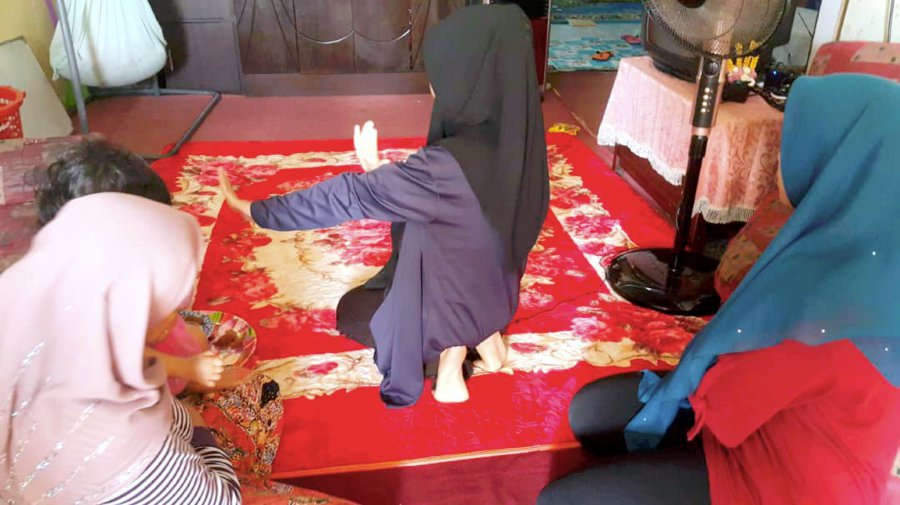The boring, non-mystical reason why hysteria is so common in Kelantan

- 234Shares
- Facebook226
- Twitter1
- LinkedIn1
- WhatsApp5
Of all the things that happen in Malaysian high schools, mass hysteria might be the most bizarre. Because think about it; one person who starts freaking out and screaming for no apparent reason isn’t so crazy, but a whole group of people at the same time? Now that’s something.
In fact, it’s gotten so prevalent here (especially in Kelantan), that Malaysia has been dubbed the world’s ‘Mass Hysteria Capital’. It’s such a problem that Universiti Malaysia Pahang has even come up with an ‘anti-hysteria kit’ worth RM8,750.
And as one would expect, the supernatural has often been cited as being the root cause:
“Science is important but it can’t fully explain the supernatural. Non-believers won’t understand these attacks unless it happens to them.” – Zaki Ya, Muslim spiritual healer
But of course, while we acknowledge the important role spirituality plays in Malaysian society, we were very interested to hear the scientific perspective on mass hysteria. For this, we got in touch with two mental health professionals from MentCouch Psychology Centre Malaysia.

Counselor Syahirah Husna binti Rusdi (left) and psychologist Tanjina Ashraf Khan Mou (right) of MentCouch Psychology Centre.
And from this discussion, we found out some very interesting things about hysteria. For one…
No, it’s not only women who kena
Having been around for millennia, hysteria as a phenomenon has been called by many names, but in more recent times, it’s been officially replaced by ‘conversion disorder’ in the DSM-5 (which is basically the Bible of mental disorders). To put it in simple terms:
“Hysteria is defined as individual experiences that include altered emotional behavior, and altered motor and sensory functioning. Mass hysteria is when a group of people have this whole idea that something not natural is happening, and the whole group starts to exhibit hysteria symptoms.” – Tanjina Khan
Throughout the passage of history, it was seen as an ‘overwhelmingly female phenomenon’, as it seems to happen more to women, but Tanjina’s colleague Syahirah Husna binti Rusdi says this is actually not the case:
“In Ancient Egypt, it was described as ‘spontaneous uterus movement’. But in 1697, an anatomist by the name of Thomas Sydenham said that it’s not because of the uterus, but the brain. So it can happen to men as well.” – Syahirah Husna

In Ancient Egypt, mental disorders were believed to be caused by the heart and uterus. Image from: Twitter user @surimana16
And apparently, this idea of hysteria being a female thing was reinforced through the ages, persisting until modern times:
“If we look at the statistics, (sociologist and hysteria expert) Robert Bartholemew did research in Malaysia and Singapore. It’s not actually proven that it’s women only. Both genders suffer almost the same.” – Tanjina Khan
Syahirah adds that the main difference is more of how it is expressed, rather than who:
“Men tend to express it through violence and aggression more as compared to women.” – Syahirah Husna
But why does it happen in the first place? Our professional friends say…
It’s caused by something called the nocebo effect
Similar to the placebo effect, a nocebo is when something bad happens because someone is expecting a bad outcome.
One thing that’s immediately obvious is that it seems to happen more frequently in very specific places, such as in schools, and particularly in the state of Kelantan. In fact, in 2016, there was an ‘epidemic’ of mass hysteria cases in Kelantan which saw hundreds of students and teachers exhibiting the symptoms, while in 2018, one Kelantanese school got it three times in a month. Tanjina says that the nocebo effect is to blame for this:
“If you look at the article, Kelantan and all the areas that have experienced hysteria, those are the most religiously conservative areas. It’s not a bad thing; what happens is that when a certain place is very religious and conservative, and maybe the education and awareness level is slightly lower, they tend to bend towards the spiritual aspect of things.” – Tanjina Khan
Expanding on that, Tanjina says that a spiritual belief in hysteria reinforces the idea, thus resulting in a very potent nocebo effect. Citing a research paper by Bartholomew in a boarding school in Kedah, she says this nocebo, coupled with the various stressors schoolchildren face, may point to why it tends to happen more in rural schools.
“When you’re living in a certain household or community where they are having such spiritual beliefs, you tend to inherit a personality that believes in this sort of thing.” – Tanjina Khan
Interestingly, Bartholomew himself believes that these outbreaks tend to happen more in all-female boarding schools, as they are the strictest:
“The girls, ages 13-17, complained of too much religion and study, and too little recreation.” – Robert Bartholomew, in an email to BBC
With that being said, Tanjina stresses that because it takes place collectively, it’s not fair to say that it is due to mental weakness, but rather that it happens because of a great lack of awareness and a lack of a scientific, practical way of thinking.
With that being said, the treatment they prescribed for hysteria was actually quite surprising, because they say…
People should call in an ustaz if there is an outbreak of hysteria
Wait, what?
So after all the talk about the scientific method, professional psychologists still tell us to call an ustaz? Do they not believe in their own training? Well, as it turns out, there’s a very smart logic behind this approach. You see, because a community may already be quite well-fed on the spiritual, a psychologist walking in to say ‘this is completely psychological’ would likely be kicked out. Their suggested approach? A joint campaign involving both religious and medical aspects:
“I would like to bring both the Ustaz and the psychologist together and reach out to particular local communities where mass hysteria is prevalent. An Ustaz can better deliver a message to them as they have a certain level of trust already developed the local public.” – Tanjina Khan
But suppose that a sufferer approached them fully open to the idea of the scientific method of treatment? Tanjina says that they would then conduct a screening to first determine that the person actually has hysteria rather than guessing. Once that’s done, they would go through the usual counseling, cognitive behavioral therapy (CBT), and/or desensitization treatments. And fear not, as Tanjina describes this as a pleasant experience for an individual to go through.
Well, there you have it. Of course, both religion and science prescribe certain treatments for hysteria, but whichever one you decide on will depend on what you think you need. And at the end of the day, it’s important to understand that one cannot be forced into seeking any particular form of treatment; you’ve got to want to be helped in order to seek it.
In any case, as a take-away message, Tanjina hopes for greater awareness from the public on critical thinking, especially on the placebo/nocebo effect, to better help themselves make educated decisions:
“I’m not completely degrading the spiritual or religious aspects, I’m just saying that a person should have this idea to weigh both scientific and spiritual ideas together.” – Tanjina
Special thanks to Tanjina and Syahirah of MentCouch, who were gracious enough to not only sit down and answer our questions in person, but also to prepare 3 full pages worth of notes for our reference! Because as Tanjina says:
“We are psychologists and counselors; we don’t want to give personal opinions not backed by research.” – Tanjina Khan
- 234Shares
- Facebook226
- Twitter1
- LinkedIn1
- WhatsApp5










